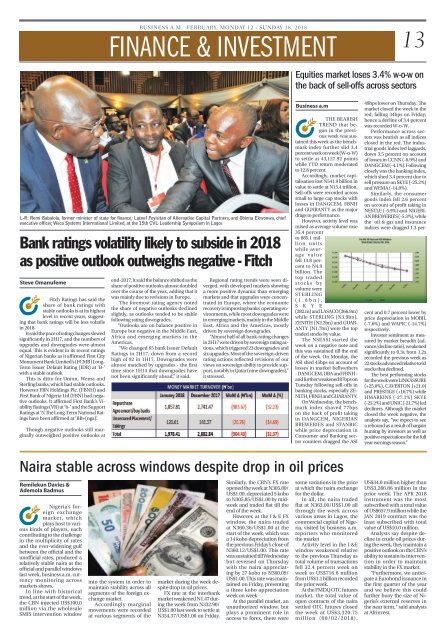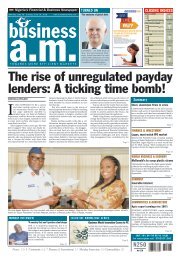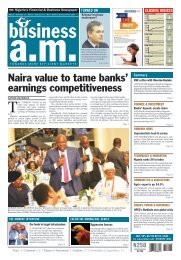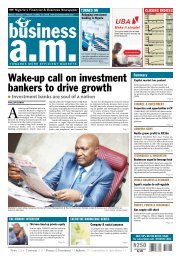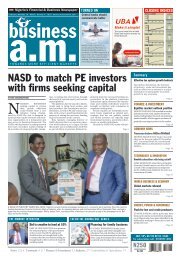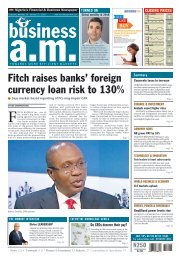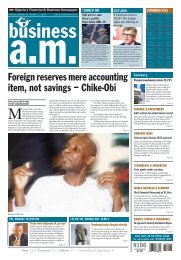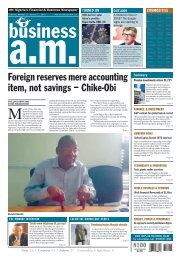12-02-2018
You also want an ePaper? Increase the reach of your titles
YUMPU automatically turns print PDFs into web optimized ePapers that Google loves.
BUSINESS A.M. FEBRUARY, MONDAY <strong>12</strong> - SUNDAY 18, <strong>2018</strong><br />
FINANCE & INVESTMENT<br />
13<br />
Equities market loses 3.4% w-o-w on<br />
the back of sell-offs across sectors<br />
L-R: Remi Babalola, former minister of state for finance; Lateef Feyisitan of Alternative Capital Partners, and Obinna Ekwonwa, chief<br />
executive officer, Weco Systems International Limited, at the 15th CVL Leadership Symposium in Lagos<br />
Bank ratings volatility likely to subside in <strong>2018</strong><br />
as positive outlook outweighs negative - Fitch<br />
Steve Omanufeme<br />
Fitch Ratings has said the<br />
share of bank ratings with<br />
stable outlooks is at its highest<br />
level in recent years, suggesting<br />
that bank ratings will be less volatile<br />
in <strong>2018</strong>.<br />
It said the pace of rating changes slowed<br />
significantly in 2H17, and the numbers of<br />
upgrades and downgrades were almost<br />
equal. This is evident in its recent ratings<br />
of Nigerian banks as it affirmed First City<br />
Monument Bank Limited’s (FCMB) Long-<br />
Term Issuer Default Rating (IDR) at ‘B-’<br />
with a stable outlook<br />
This is ditto for Union, Wema and<br />
Sterling banks, which had stable outlooks.<br />
However FBN Holdings Plc. (FBNH) and<br />
First Bank of Nigeria Ltd (FBN) had negative<br />
outlooks. It affirmed First Bank’s Viability<br />
Ratings (VR) at ‘b-’ and the Support<br />
Ratings at ‘5’. The Long-Term National Ratings<br />
have been affirmed at ‘BB+(nga)’.<br />
Though negative outlooks still marginally<br />
outweighed positive outlooks at<br />
end-2017, it said the balance shifted as the<br />
share of positive outlooks almost doubled<br />
over the course of the year., adding that it<br />
was mainly due to revisions in Europe.<br />
The foremost rating agency noted<br />
the share of negative outlooks declined<br />
slightly, as outlooks tended to be stable<br />
following rating downgrades.<br />
“Outlooks are on balance positive in<br />
Europe but negative in the Middle East,<br />
Africa and emerging markets in the<br />
Americas.<br />
“We changed 65 bank Issuer Default<br />
Ratings in 2H17, down from a record<br />
high of 92 in 1H17. Downgrades were<br />
almost matched by upgrades - the first<br />
time since 1H14 that downgrades have<br />
not been significantly ahead,” it said.<br />
Regional rating trends were seen diverged,<br />
with developed markets showing<br />
a more positive dynamic than emerging<br />
markets and that upgrades were concentrated<br />
in Europe, where the economic<br />
recovery is improving banks’ operating environments,<br />
while most downgrades were<br />
in emerging markets, mainly in the Middle<br />
East, Africa and the Americas, mostly<br />
driven by sovereign downgrades.<br />
“Almost half of all bank-rating changes<br />
in 2H17 were driven by sovereign rating actions,<br />
which triggered 23 downgrades and<br />
six upgrades. Most of the sovereign-driven<br />
rating actions reflected revisions of our<br />
views on sovereign ability to provide support,<br />
notably in Qatar (nine downgrades),”<br />
it stressed.<br />
Business a.m<br />
THE BEARISH<br />
TREND that began<br />
in the previous<br />
week was sustained<br />
this week as the benchmark<br />
index further slid 3.4<br />
percent week on week (W-o-W)<br />
to settle at 43,<strong>12</strong>7.92 points<br />
while YTD return moderated<br />
to <strong>12</strong>.8 percent.<br />
Accordingly, market capitalisation<br />
lost N541.9 billion in<br />
value to settle at N15.4 trillion.<br />
Sell-offs were recorded across<br />
small to large cap stocks with<br />
losses in DANGCEM, FBNH<br />
and GUARANTY as the major<br />
drags to performance.<br />
However, activity level was<br />
mixed as average volume rose<br />
35.4 percent<br />
to 885.1 million<br />
units<br />
while average<br />
value<br />
fell 13.8 percent<br />
to N4.9<br />
billion. The<br />
top traded<br />
stocks by<br />
volume were<br />
STERLING<br />
(1.8bn),<br />
S K Y E<br />
(282.m) and LASACO (266.9m)<br />
while STERLING (N3.9bn),<br />
ZENITH (N2.2bn) and GUAR-<br />
ANTY (N1.7bn) were the top<br />
traded stocks by value.<br />
The NSEASI started the<br />
week on a negative note and<br />
this was sustained till the end<br />
of the week. On Monday, the<br />
ASI shed 45bps on account of<br />
losses in market bellwethers<br />
- DANGCEM, UBA and FBNH -<br />
and further weakened 87bps on<br />
Tuesday following sell-offs in<br />
banking stocks, especially ZE-<br />
NITH, FBNH and GUARANTY.<br />
On Wednesday, the benchmark<br />
index shaved 77bps<br />
on the back of profit taking<br />
in DANGCEM, NIGERIAN<br />
BREWERIES and STANBIC<br />
while price depreciation in<br />
Consumer and Banking sector<br />
counters dragged the ASI<br />
49bps lower on Thursday. The<br />
market closed the week in the<br />
red, falling 34bps on Friday;<br />
hence a decline of 3.4 percent<br />
was recorded W-o-W.<br />
Performance across sectors<br />
was bearish as all indices<br />
closed in the red. The industrial<br />
goods index led laggards,<br />
down 3.5 percent on account<br />
of losses in CCNN (-6.9%) and<br />
DANGCEM (-4.1%). Following<br />
closely was the banking index,<br />
which shed 3.4 percent due to<br />
sell pressure on SKYE (-25.2%)<br />
and WEMA (-14.0%).<br />
Similarly, the consumer<br />
goods index fell 2.6 percent<br />
on account of profit taking in<br />
NESTLE (-5.9%) and NIGERI-<br />
AN BREWERIES (-5.3%), while<br />
the oil & gas and insurance<br />
indices were dragged 1.3 percent<br />
and 0.7 percent lower by<br />
price depreciation in MOBIL<br />
(-7.6%) and WAPIC (-14.7%)<br />
respectively.<br />
Investor sentiment as measured<br />
by market breadth (advance/decline<br />
ratio), weakened<br />
significantly to 0.3x from 1.2x<br />
recorded the previous week as<br />
22 stocks advanced relative to 63<br />
stocks that declined.<br />
The best performing stocks<br />
for the week were LINKASSURE<br />
(+25.0%), CAVERTON (+21.0)<br />
and PRESTIGE (+16.7%) while<br />
HMARKINS (-27.1%) SKYE<br />
(-25.2%) and UNIC (-21.7%) led<br />
decliners. Although the market<br />
closed the week negative, the<br />
analysts say, “we expect to see<br />
a rebound as a result of bargain<br />
hunting by investors as well as<br />
positive expectations for the full<br />
year earnings season.”<br />
Naira stable across windows despite drop in oil prices<br />
Remilekun Davies &<br />
Ademola Badmus<br />
Nigeria’s foreign<br />
exchange<br />
market, which<br />
plays host to various<br />
kinds of players, each<br />
contributing to the challenge<br />
in the multiplicity of rates<br />
and the ever-widening gulf<br />
between the official and the<br />
unofficial rates, produced a<br />
relatively stable naira at the<br />
official and parallel windows<br />
last week, business a.m. currency<br />
monitoring across<br />
markets shows.<br />
In line with historical<br />
trend, at the start of the week,<br />
the CBN injected US$100.0<br />
million via the wholesale<br />
SMIS intervention window<br />
into the system in order to<br />
maintain stability across all<br />
segments of the foreign exchange<br />
market.<br />
Accordingly marginal<br />
movements were recorded<br />
at various segments of the<br />
market during the week despite<br />
drop in oil prices.<br />
FX rate at the interbank<br />
market weakened N1.47 during<br />
the week from N332.90/<br />
US$1.00 last week to settle at<br />
N334.37/US$1.00 on Friday.<br />
Similarly, the CBN’s FX rate<br />
opened the week at N305.80/<br />
US$1.00, depreciated 5 kobo<br />
to N305.85/US$1.00 by midweek<br />
and traded flat till the<br />
end of the week.<br />
However, at the I & E FX<br />
window, the naira traded<br />
at N360.36/US$1.00 at the<br />
start of the week, which was<br />
a 14 kobo depreciation from<br />
the previous Friday’s close of<br />
N360.<strong>12</strong>/US$1.00. This rate<br />
was sustained till Wednesday<br />
but reversed on Thursday<br />
with the naira appreciating<br />
by 27 kobo to N360.09/<br />
US$1.00. This rate was maintained<br />
on Friday, presenting<br />
a three kobo appreciation<br />
week on week.<br />
At the parallel market, an<br />
unauthorized window, but<br />
plays a prominent role in<br />
access to forex, there were<br />
some variations in the price<br />
at which the naira exchange<br />
for the dollar.<br />
In all, the naira traded<br />
flat at N363.00/US$1.00 all<br />
through the week across<br />
various areas in Lagos, the<br />
commercial capital of Nigeria,<br />
visited by business a.m.<br />
reporters who monitored<br />
the market<br />
Activity level in the I &E<br />
window weakened relative<br />
to the previous Thursday as<br />
total volume of transactions<br />
fell 32.4 percent week on<br />
week to US$716.6 million<br />
from US$1.1 billion recorded<br />
the prior week.<br />
At the FMDQ OTC futures<br />
market, the total value of<br />
open contracts of the naira<br />
settled OTC futures closed<br />
the week at US$3,320.75<br />
million (08/<strong>02</strong>/<strong>2018</strong>),<br />
US$34.0 million higher than<br />
US$3,286.86 million in the<br />
prior week. The APR <strong>2018</strong><br />
instrument was the most<br />
subscribed with a total value<br />
of US$657.9 million while the<br />
JAN 2019 contract was the<br />
least subscribed with total<br />
value of US$10.0 million.<br />
Analysts say despite decline<br />
in crude oil prices during<br />
the week, they maintain a<br />
positive outlook on the CBN’s<br />
ability to sustain its intervention<br />
in order to maintain<br />
stability in the FX market.<br />
“Furthermore, we anticipate<br />
a Eurobond issuance in<br />
the first quarter of the year<br />
and we believe this could<br />
further buoy the size of Nigeria’s<br />
external reserves in<br />
the near term,” said analysts<br />
at Afrinvest.


